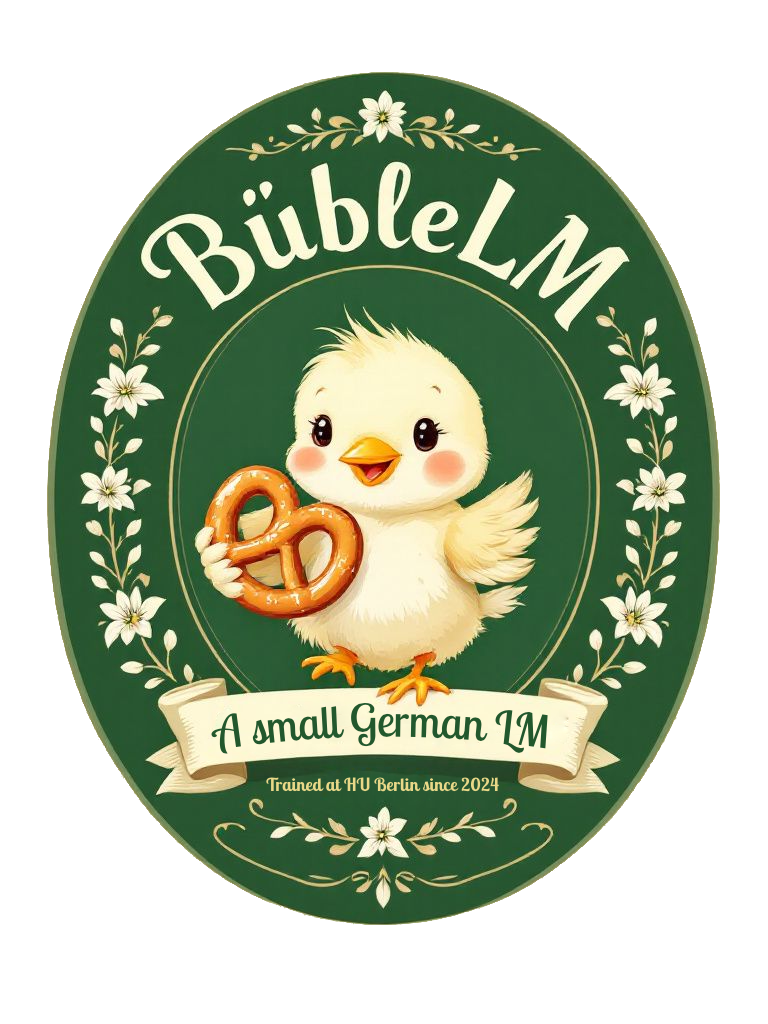BübleLM

BübleLM
A small German LM
BübleLM is a German language model based on Gemma-2-2B, adapted using trans-tokenization with a custom German SentencePiece tokenizer. The model demonstrates how language-specific tokenization can significantly improve performance while maintaining the base model's capabilities.
Model Details
- Architecture: Based on Gemma-2B decoder-only architecture
- Parameters: 2 billion
- Tokenizer: Custom German SentencePiece tokenizer (20k vocabulary)
- Fertility rate: 1.78 tokens per word
- Optimized for German morphological structures
- Trained on the same corpus as the model
- Context Length: 8192 tokens
- Training Hardware: Single node with 4x NVidia A100-SXM4-80GB GPUs
Training Data
Trained on 3.5B tokens from Occiglot-FineWeb project, including:
- Contemporary web content (OSCAR 2015-2023)
- Legislative documents (EurLex, ParlamInt)
- News data (Tagesschau)
- Wiki sources
Data sampling weights:
- Wikipedia: 4x
- News/Parliamentary: 2x
- Other sources: 1x
Performance
Key improvements over Gemma-2-2B baseline:
- HellaSwag-DE: +71% (47.9% vs 28.0%)
- ARC-DE: +41% (32.3% vs 22.9%)
- Average zero-shot: +40% (35.8% vs 25.5%)
→ BübleLM-2B consistently outperforms both the base Gemma-2-2B and other German models like LLäMmlein-1B across most tasks.
| Model | ARC-DE | HellaSwag-DE | TruthfulQA-DE | Average | ||
|---|---|---|---|---|---|---|
| 0-shot | 3-shot | 0-shot | 3-shot | 0-shot | 0-shot | |
| Gemma-2-2B | 22.9 | 23.1 | 28.0 | 27.6 | 25.5 | 25.5 |
| LLäMmlein-120M | 24.7 ↑+8% | - | 32.0 ↑+14% | - | 25.0 ↓-2% | 27.2 ↑+7% |
| LLäMmlein-1B | 30.0 ↑+31% | - | 48.5 ↑+73% | - | 23.4 ↓-8% | 34.0 ↑+33% |
| Sauerkraut-Gemma-2B | 28.0 ↑+22% | 34.6 ↑+50% | 37.2 ↑+33% | 44.1 ↑+60% | 32.9 ↑+29% | 32.7 ↑+28% |
| BübleLM (Ours) | 32.3 ↑+41% | 35.2 ↑+52% | 47.9 ↑+71% | 46.6 ↑+69% | 27.2 ↑+7% | 35.8 ↑+40% |
Performance evaluated on German versions of ARC (knowledge-based QA), HellaSwag (commonsense reasoning), and TruthfulQA (truthfulness). Values show accuracy in percentages, with arrows indicating relative improvement over Gemma-2B baseline. Best results shown in bold.
Safety & Ethics
Toxicity
- Perplexity: 52.97 on German TextDetox dataset
- Toxic content appears more out-of-distribution compared to baseline
Gender Bias
- Evaluated using perplexity differences between traditional and gender-inclusive forms
- Slight preference for gender-inclusive language (not statistically significant)
- Example: "Lehrer" vs "Lehrer*innen" (∆PPL = -9.61)
Usage
Note: This is a base language model, not an instruction-tuned model. It is not optimized for chat or instruction following. For best results, use standard text completion rather than chat templates.
Also make sure you have the sentencepiece tokenizer installed:
pip install sentencepiece
from transformers import pipeline
pipe = pipeline("text-generation", model="flair/bueble-lm-2b")
pipe("Ich bin")
Or with the full model api:
from transformers import AutoTokenizer, AutoModelForCausalLM
tokenizer = AutoTokenizer.from_pretrained("flair/bueble-lm-2b")
model = AutoModelForCausalLM.from_pretrained(
"flair/bueble-lm-2b",
device_map="auto",
torch_dtype=torch.bfloat16
)
# Basic text completion
text = "Berlin ist eine Stadt, die"
inputs = tokenizer(text, return_tensors="pt").to("cuda")
outputs = model.generate(**inputs, max_new_tokens=256)
print(tokenizer.decode(outputs[0]))
For instruction-tuning experiments or chat applications, we recommend fine-tuning the model first with appropriate German instruction datasets.
Limitations
- Limited vocabulary size (20k tokens) compared to multilingual models (250k for Gemma)
- Performance may vary on specialized domains not well-represented in training data
- Higher fertility rate (1.78) due to smaller vocabulary size
- Inherits base limitations from Gemma architecture
Citation
@article{delobelle2024buble,
title={BübleLM: A small German LM},
author={Delobelle, Pieter and Akbik, Alan and others},
year={2024}
}
- Downloads last month
- 41